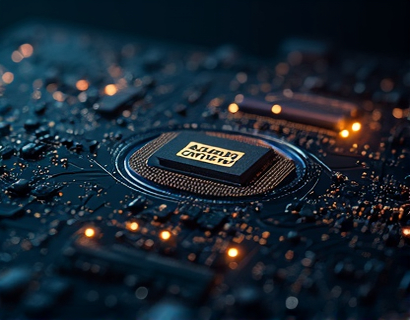Smart Contract Solutions for Pegged Token Creation and Seamless DeFi Exchange
In the rapidly evolving world of cryptocurrency and decentralized finance (DeFi), smart contracts have emerged as a pivotal technology, offering innovative solutions for various financial needs. One of the most significant applications of smart contracts is in the creation of stable digital currencies pegged to established assets like UCASH, along with facilitating seamless bidirectional trading. This article delves into how smart contracts are transforming the landscape of digital currency management, providing secure, efficient, and user-friendly tools that set a new standard in the modern economy.
Smart contracts are self-executing contracts with the terms of the agreement directly written into code. They run on blockchain technology, ensuring transparency, immutability, and security. When applied to the creation of stablecoins pegged to UCASH, smart contracts automate the process of maintaining the stablecoin's value in relation to UCASH, thereby reducing the need for intermediaries and lowering transaction costs.
Creating Stablecoins Pegged to UCASH
The process of creating a stablecoin pegged to UCASH involves several key steps, all of which are streamlined through the use of smart contracts. First, a reserve of UCASH is established, which serves as the backing for the stablecoin. This reserve is stored in a smart contract, ensuring that it is securely held and transparently managed.
The smart contract is programmed to maintain a 1:1 ratio between the stablecoin and UCASH. Whenever a user wants to create stablecoins, they deposit UCASH into the smart contract. The contract then automatically issues an equivalent amount of stablecoins, updating the reserves and the stablecoin balance in real-time. This ensures that the stablecoin's value remains pegged to UCASH.
Conversely, when a user wishes to redeem stablecoins for UCASH, they can initiate a redemption request through the smart contract. The contract verifies the stablecoin balance and, if sufficient, releases the corresponding amount of UCASH back to the user. This entire process is automated, instantaneous, and trustless, eliminating the need for a central authority to manage the peg.
Enhancing Stability and Flexibility
The use of smart contracts in stablecoin creation significantly enhances the stability and flexibility of the system. Traditional stablecoin issuance relies on trust in a central entity to maintain the peg, which can be a point of failure. Smart contracts remove this reliance by enforcing the peg through code, ensuring that the stablecoin's value remains consistent with UCASH at all times.
Moreover, smart contracts enable real-time adjustments to the stablecoin supply based on market conditions. For instance, if there is an excess supply of stablecoins, the smart contract can automatically burn some of the tokens to maintain the peg. This dynamic adjustment mechanism helps in maintaining the stability of the stablecoin, even in volatile market conditions.
Seamless Bidirectional Trading
One of the most compelling features of smart contract-based stablecoins is the facilitation of seamless bidirectional trading. Users can easily convert stablecoins to UCASH and vice versa without the hassle of going through multiple platforms or dealing with different types of exchanges. The smart contract acts as a decentralized exchange (DEX) where users can trade stablecoins for UCASH and back again, all within the same ecosystem.
This bidirectional trading capability is achieved through the design of the smart contract, which includes functions for both creation and redemption of stablecoins. Users can interact with the contract using standard blockchain wallets, making the process accessible and user-friendly. The smart contract ensures that trades are executed instantly and without the need for manual intervention, reducing the risk of errors and delays.
Benefits of Smart Contract Solutions
The adoption of smart contract solutions for stablecoin creation and DeFi exchanges offers numerous benefits. First and foremost, it enhances security. Since all transactions are recorded on the blockchain, there is a high level of transparency and immutability, reducing the risk of fraud and manipulation.
Efficiency is another significant advantage. Smart contracts automate most of the processes involved in stablecoin management and trading, eliminating the need for intermediaries and reducing transaction costs. This makes the system more cost-effective and faster, appealing to both individual users and institutional investors.
User-friendliness is also a key benefit. The decentralized nature of smart contracts means that users can interact with the system using their own wallets, without the need for complex accounts or permissions. This democratizes access to financial tools, making DeFi more inclusive and accessible to a broader audience.
Challenges and Considerations
While smart contract solutions offer many advantages, there are also challenges and considerations that need to be addressed. One of the primary concerns is the smart contract's code security. Any vulnerabilities in the code can be exploited, leading to potential losses. Therefore, rigorous testing and auditing of smart contracts are essential to ensure their reliability and security.
Another consideration is regulatory compliance. As the use of stablecoins and DeFi platforms grows, regulatory bodies are increasingly scrutinizing these technologies. Developers must stay informed about regulatory requirements and ensure that their smart contracts comply with relevant laws and regulations to avoid legal issues.
Scalability is also an important factor. As the number of users and transactions increases, the smart contract system must be able to handle the load efficiently. This requires careful design and optimization of the smart contracts to ensure they can scale without compromising performance.
Future Prospects
The future of smart contract-based stablecoins and DeFi exchanges looks promising. As blockchain technology continues to mature, we can expect improvements in smart contract functionality, security, and scalability. The integration of advanced features such as yield farming, liquidity provision, and decentralized lending will further enhance the flexibility and utility of these platforms.
Moreover, the cross-chain interoperability of smart contracts will enable the creation of more interconnected and robust DeFi ecosystems. This will allow users to seamlessly interact with different blockchains and platforms, fostering innovation and growth in the DeFi space.
In conclusion, smart contract solutions for pegged token creation and seamless DeFi exchanges represent a significant advancement in the field of cryptocurrency and DeFi. By providing secure, efficient, and user-friendly tools, these solutions are setting a new standard for digital currency management and financial innovation. As the technology continues to evolve, it will play an increasingly important role in shaping the future of the modern economy.










































